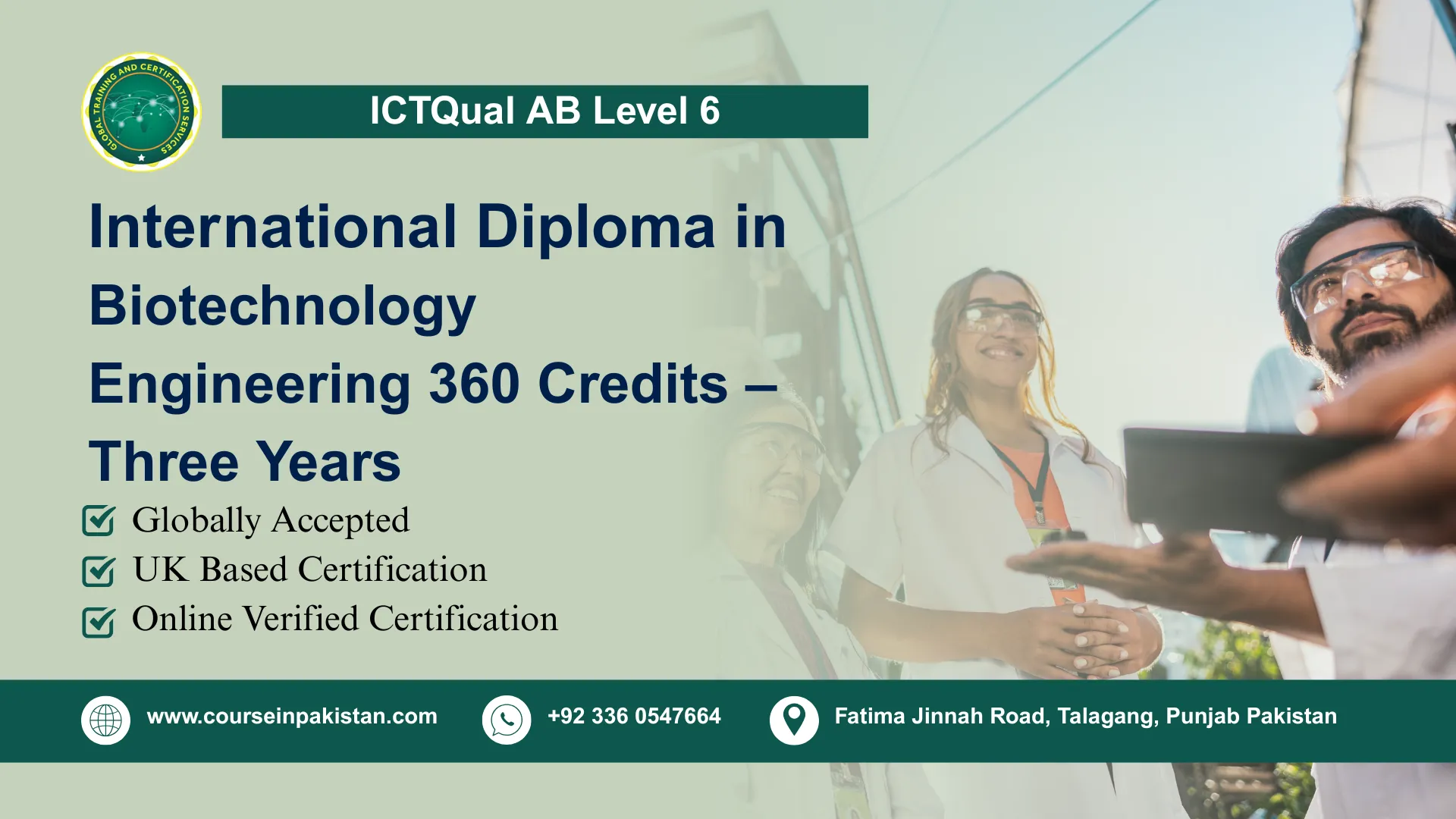
The ICTQual Level 6 Diploma in Biotechnology Engineering (360 Credits – Three Years) is a globally recognized program designed to equip learners with advanced knowledge and practical skills in biotechnology. This qualification covers the latest trends, technologies, and applications in the field, preparing students for careers in research, pharmaceuticals, healthcare, agriculture, and environmental biotechnology. Whether you are a fresh graduate looking to establish a strong foundation or an experienced professional seeking formal recognition of your expertise, this diploma provides a pathway to professional growth and global employability.
With a focus on both theoretical understanding and practical applications, this diploma allows learners to develop critical thinking, problem-solving, and technical competencies essential for modern biotechnology industries. Assignment-based learning ensures flexibility, enabling students to study at their own pace while balancing professional and personal commitments.
Course Overview
Key Highlights of the Course:
- Fully assignment-based program for self-paced learning.
- 360 credits qualification recognized internationally.
- Suitable for fresh graduates and experienced professionals.
- British Council verificable, MOFA and Embassy attestable for global recognition.
- Iqama approval eligible, enhancing career opportunities in Gulf countries.
Course Benefits
1. Career Advancement
- Opens opportunities in biotechnology research, pharmaceuticals, healthcare, and agriculture.
- Recognized qualification for managerial and technical roles in biotech industries.
- Enhances credibility with employers and international organizations.
- Supports applications for higher professional positions or specialized roles.
- Enables engagement in cutting-edge biotech projects and innovation initiatives.
2. Flexibility and Convenience
- Fully assignment-based, allowing learners to study at their own pace.
- Access course materials and complete assessments from anywhere in the world.
- Suitable for working professionals to balance learning and career.
- Offers a flexible approach for fresh graduates to complete the program within three years.
- Allows experienced professionals to fast-track certification based on prior knowledge and experience.
3. Global Recognition
- British Council verificable, MOFA and Embassy attestable, enhancing international employability.
- Qualification accepted for Iqama approval and professional recognition in Gulf countries.
- Opens opportunities for global biotechnology research, consultancy, and industrial projects.
- Recognized by employers and institutions worldwide for advanced biotechnology expertise.
4. Suitable for All Levels of Experience
- Fresh learners complete 36 assignments within three years to achieve certification.
- Experienced professionals can submit proof of at least six years of verifiable experience.
- Professional discussion with ICTQual AB approved assessor validates knowledge for experienced candidates.
- Encourages lifelong learning and professional development.
5. Comprehensive Biotechnology Knowledge
- Covers molecular biology, genetic engineering, bioprocess technology, and bioinformatics.
- Emphasizes practical application, research skills, and innovation.
- Prepares candidates for leadership and decision-making roles in biotech projects.
- Focuses on sustainable and industrial applications of biotechnology.
Course Study Units
This qualification, the ICTQual Level 6 Diploma in Biotechnology Engineering 360 Credits – Three Years, consists of 36 mandatory units.
Year 1: Foundations of Biotechnology Engineering
- Introduction to Biotechnology
- Principles of Molecular Biology
- Basics of Biochemistry
- Fundamentals of Microbiology
- Introduction to Genetics and Genomics
- Principles of Cell Biology
- Mathematics for Biotechnology
- Fundamentals of Biostatistics
- Introduction to Engineering in Biotechnology
- Analytical Techniques in Biotechnology
- Basics of Bioinformatics
- Environmental Science and Sustainability
Year 2: Intermediate Biotechnology Concepts
- Bioprocess Engineering and Design
- Applied Microbiology and Industrial Applications
- Recombinant DNA Technology
- Biomaterials and Nanotechnology
- Immunology and Vaccine Development
- Protein Engineering and Enzyme Technology
- Bioinformatics Tools and Applications
- Environmental Biotechnology and Waste Management
- Bioreactors and Fermentation Technology
- Biomedical Engineering Basics
- Advanced Biostatistics and Data Analysis
- Ethical and Regulatory Aspects of Biotechnology
Year 3: Advanced Topics and Specialization
- Genetic Engineering and Genomic Editing
- Advanced Bioprocess Engineering
- Biotechnology Research Methods
- Pharmaceutical Biotechnology and Drug Development
- Systems Biology and Computational Modeling
- Agricultural Biotechnology and GMOs
- Industrial Biotechnology and Bioeconomy
- Synthetic Biology Applications
- Advanced Environmental Biotechnology
- Innovation and Entrepreneurship in Biotechnology
- Biotechnology Project Management
- Final Year Research Project
Learning Outcomes
Year 1: Foundations of Biotechnology Engineering
1. Introduction to Biotechnology
- Understand the scope and significance of biotechnology in modern science and industry.
- Identify major branches and applications of biotechnology.
- Recognize ethical, environmental, and societal implications of biotechnology.
2. Principles of Molecular Biology
- Explain DNA, RNA, and protein structure and function.
- Apply molecular biology techniques in laboratory settings.
- Understand gene expression and regulation in biological systems.
3. Basics of Biochemistry
- Identify the structure and function of biomolecules.
- Explain enzymatic reactions and metabolic pathways.
- Apply biochemical principles to problem-solving in biotechnology.
4. Fundamentals of Microbiology
- Understand microbial structure, growth, and metabolism.
- Apply sterilization, culturing, and identification techniques.
- Recognize the role of microorganisms in industry and health.
5. Introduction to Genetics and Genomics
- Explain Mendelian genetics and inheritance patterns.
- Understand genome organization and sequencing technologies.
- Apply basic principles of genomics in research and diagnostics.
6. Principles of Cell Biology
- Describe cell structure, organelles, and cellular processes.
- Understand cell signaling, division, and differentiation.
- Apply cell biology principles to experimental biotechnology.
7. Mathematics for Biotechnology
- Apply algebra, calculus, and statistics to biological problems.
- Use mathematical models for interpreting experimental data.
- Solve quantitative problems in biotechnology experiments.
8. Fundamentals of Biostatistics
- Apply statistical techniques to analyze biological data.
- Understand probability, sampling, and hypothesis testing.
- Interpret experimental results accurately.
9. Introduction to Engineering in Biotechnology
- Understand engineering principles applied to biotechnology processes.
- Analyze basic bioprocess systems and equipment.
- Apply engineering concepts to laboratory and industrial contexts.
10. Analytical Techniques in Biotechnology
- Apply spectroscopy, chromatography, and electrophoresis methods.
- Interpret experimental data from analytical techniques.
- Ensure accuracy and reliability in laboratory measurements.
11. Basics of Bioinformatics
- Understand biological databases and sequence analysis tools.
- Apply computational tools to analyze genetic and protein sequences.
- Interpret bioinformatics results for research applications.
12. Environmental Science and Sustainability
- Understand the environmental impact of biotechnology processes.
- Apply principles of sustainability in biotechnology projects.
- Identify methods to reduce waste and improve resource efficiency.
Year 2: Intermediate Biotechnology Concepts
13. Bioprocess Engineering and Design
- Design and optimize bioprocesses for industrial applications.
- Apply mass and energy balances in bioreactor design.
- Evaluate efficiency and scalability of bioprocess systems.
14. Applied Microbiology and Industrial Applications
- Apply microbiology in fermentation, pharmaceuticals, and food industries.
- Implement microbial control strategies in industrial processes.
- Analyze case studies of microbial applications.
15. Recombinant DNA Technology
- Understand recombinant DNA techniques and cloning strategies.
- Apply genetic modification techniques in laboratory experiments.
- Evaluate ethical and safety considerations in recombinant DNA work.
16. Biomaterials and Nanotechnology
- Identify biomaterials for medical and industrial applications.
- Understand principles of nanotechnology in biotechnology.
- Apply nanotechnology concepts in biotechnology research.
17. Immunology and Vaccine Development
- Explain immune system components and responses.
- Understand vaccine design, development, and delivery methods.
- Apply immunological techniques in research and industry.
18. Protein Engineering and Enzyme Technology
- Design and modify enzymes for specific functions.
- Apply protein engineering methods in industrial biotechnology.
- Evaluate enzyme kinetics and applications.
19. Bioinformatics Tools and Applications
- Utilize software tools for genomics, proteomics, and systems biology.
- Analyze large biological datasets computationally.
- Apply bioinformatics solutions in research and industrial projects.
20. Environmental Biotechnology and Waste Management
- Apply biotechnological solutions to environmental problems.
- Understand microbial and enzymatic processes for waste treatment.
- Evaluate sustainable bioremediation strategies.
21. Bioreactors and Fermentation Technology
- Design and operate bioreactors for microbial and cell culture.
- Apply fermentation principles for industrial production.
- Monitor and optimize bioprocess parameters.
22. Biomedical Engineering Basics
- Understand biomedical devices and tissue engineering principles.
- Apply engineering concepts to healthcare biotechnology.
- Evaluate applications of biotechnology in medical fields.
23. Advanced Biostatistics and Data Analysis
- Analyze experimental data using advanced statistical methods.
- Interpret biotechnological research results accurately.
- Apply statistical software for data analysis in biotechnology.
24. Ethical and Regulatory Aspects of Biotechnology
- Understand ethical frameworks in biotechnology research and applications.
- Comply with national and international regulations.
- Evaluate case studies for ethical decision-making in biotech projects.
Year 3: Advanced Topics and Specialization
25. Genetic Engineering and Genomic Editing
- Apply CRISPR, TALEN, and other genome editing technologies.
- Design experiments for genetic modification.
- Assess ethical and safety considerations in genetic engineering.
26. Advanced Bioprocess Engineering
- Optimize large-scale bioprocess systems for industrial production.
- Apply advanced control and monitoring techniques.
- Evaluate cost-effectiveness and sustainability of bioprocesses.
27. Biotechnology Research Methods
- Design and conduct biotechnology research projects.
- Apply appropriate laboratory and analytical techniques.
- Interpret experimental results and prepare scientific reports.
28. Pharmaceutical Biotechnology and Drug Development
- Understand drug discovery, formulation, and production processes.
- Apply biotechnology techniques in pharmaceutical research.
- Evaluate regulatory and safety standards in drug development.
29. Systems Biology and Computational Modeling
- Model biological systems computationally.
- Analyze interactions between genes, proteins, and metabolic pathways.
- Apply systems biology for predictive and experimental research.
30. Agricultural Biotechnology and GMOs
- Apply biotechnology in crop improvement and pest management.
- Understand genetically modified organisms and regulatory issues.
- Evaluate environmental and economic impacts of agricultural biotech.
31. Industrial Biotechnology and Bioeconomy
- Apply biotechnology in industrial production of chemicals, fuels, and materials.
- Understand bio-based economies and sustainable industrial practices.
- Evaluate commercialization potential of industrial biotech projects.
32. Synthetic Biology Applications
- Design and construct synthetic biological systems.
- Apply principles of modular and programmable biotechnology.
- Assess ethical, safety, and industrial implications.
33. Advanced Environmental Biotechnology
- Apply biotechnological approaches to environmental sustainability.
- Monitor and mitigate industrial and urban pollution.
- Evaluate innovative solutions for ecosystem management.
34. Innovation and Entrepreneurship in Biotechnology
- Develop business plans for biotech startups.
- Apply entrepreneurial skills in research commercialization.
- Identify opportunities for innovation in biotechnology sectors.
35. Biotechnology Project Management
- Plan, execute, and monitor biotechnology projects effectively.
- Apply risk management, budgeting, and team coordination skills.
- Evaluate project outcomes and quality assurance in biotech settings.
36. Final Year Research Project
- Conduct independent research in a biotechnology topic.
- Apply laboratory, analytical, and data interpretation skills.
- Prepare a professional report and defend findings to assessors.
Who is This Course For?
- 1. Fresh Graduates
- Individuals who have recently completed high school or a relevant Level 5 qualification.
- Looking to establish a strong foundation in biotechnology engineering.
- Interested in a globally recognized, assignment-based program.
- Motivated to pursue careers in research, healthcare, pharmaceuticals, or industrial biotechnology.
- Keen to develop practical and theoretical skills at their own pace.
- 2. Experienced Professionals
- Biotechnology professionals with at least 6 years of verifiable experience.
- Seeking formal recognition of their skills without completing all 36 assignments.
- Interested in fast-track certification through professional discussions with ICTQual AB assessors.
- Looking for career advancement and global employment opportunities.
- Motivated to validate expertise for leadership or consultancy roles.
- 3. Career Switchers
- Professionals from related science or engineering fields seeking to transition into biotechnology.
- Motivated to acquire specialized knowledge and practical skills.
- Interested in flexible learning that accommodates work schedules.
- Seeking international certification recognized by employers and regulatory bodies.
- Keen to expand career opportunities in biotech research, development, and industrial applications.
- 4. International Learners
- Individuals aiming for global employment or academic opportunities.
- Seeking MOFA, Embassy attested, and British Council verified certification.
- Looking for Iqama-eligible qualifications for Gulf countries.
- Interested in learning without geographical or scheduling constraints.
- Motivated to gain skills and knowledge recognized worldwide.
Future Progression
- Opportunities to pursue senior roles in biotechnology research, pharmaceuticals, healthcare, and industrial biotech.
- Eligible for higher academic qualifications such as a Master’s in Biotechnology Engineering or Molecular Biology.
- Increased employability in international biotech companies and research institutions.
- Potential to engage in consultancy, project leadership, or innovation management roles.
- Recognition for professional certifications and licensing in biotechnology sectors globally.
Academic Pathways:
- Progression to Master’s degrees in Biotechnology, Molecular Biology, or Bioengineering.
- Opportunity to enroll in specialized certifications in genetic engineering, bioprocess technology, or bioinformatics.
- Pathway to professional certifications and chartered status in biotechnology fields.
- Access to advanced research and academic opportunities in universities worldwide.
Conclusion
The ICTQual Level 6 Diploma in Biotechnology Engineering (360 Credits – Three Years) is a flexible and comprehensive qualification designed for both fresh graduates and experienced professionals. With its assignment-based structure, learners can study at their own pace from anywhere in the world. The program is British Council verificable, MOFA and Embassy attestable, and eligible for Iqama approval, making it highly valuable for international career prospects. Graduates gain in-depth knowledge in molecular biology, genetic engineering, bioprocess technology, and bioinformatics, preparing them for leadership roles, research positions, and industrial applications in the global biotechnology sector.





